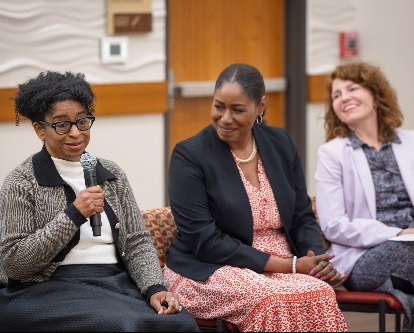
USC Brittingham Social Enterprise Lab Talks Transportation Equity Ahead of 2028 Olympics
Experts from the L.A. Metro and more discuss sustainability, accessibility, and community infrastructure improvements in Los Angeles.
A Game to Change The World
A Game to Change The World
USC Marshall student launches digital game that teaches teams how to tackle the most difficult problems facing organizations, governments and countries across the globe.

Larissa Gurjão Pereira De Lima is a jetsetter. It’s not wanderlust, exactly, that inspires her sojourns, but a desire to learn, educate and impact. On one such journey to a small town in Thailand, Gurjao explored how education is approached in different settings, with different resource sets. As an English teacher there, she realized the limitations that can come from silos and, on the flip side, the power of technology to accelerate and deepen learning.
It was then that she knew she had an opportunity to make a greater impact.
Pivoting from a career in IT, Gurjão, a USC Marshall School of Business graduate student, set for on a daunting task: changing her career. Beginning at Amani Institute’s Social Innovation Management program in Nairobi, Kenya, Gurjão said she had a clear mission to change how businesses operated. “I already had a business background,” she said, “But I wanted to do something different—help businesses be more sustainable.” From there, she enrolled in the USC Marshall Master of Science in Social Entrepreneurship (MSSE) at Brittingham Social Enterprise Lab to build her own sustainable enterprise.
Over the last five years, Gurjão has founded several organizations—all aimed at social impact through innovation, self-development and empowerment. In 2017, she founded Trips Connection, which supported organizations to identify strategies for innovation through gamification. The organization’s goal was to facilitate direct actions in solving complex social problems. Most recently, in 2019, she founded SIB Impact, a board game aimed at building team’s ability to collaborate and innovate toward solving a big, challenging—often global—problem. To heighten its impact even further, the game’s latest release—set for December 12th—will take it digital.
“I hope to travel to all 80 cities included in the game and film my experiences, showing the problems the people of the world are facing and the possible, positive solutions that they can have.”
Larissa Gurjão Pereira De Lima
Fundamentals of Gamification
Three years ago, Gurjão began building a prototype that would eventually become SIB Impact. Central to the game’s design are out-of-the-box troubleshooting, critical thinking and most important: collaboration. In the development phase, she did a lot of research about board games in general. “How do board games work,” she said. “What are their mechanics? How can they be fun and educational?”
Gurjão joined the MSSE program in June 2022, after a friend recommended several courses. “I knew I could connect with great people here,” she said, “and build my business.”
SIB Impact is an educational game that can be applied inside organizations, governments, startups, NGOs, private companies and universities alike. “The idea is to teach participants how they can create innovative solutions,” Gurjão said. “You have to help the other players solve the world’s biggest social and environmental issues.”
The game aims to create toolkits for individuals and teams to take theoretical solutions and transform them into tangible actions. In short, it aims at creating change and changemakers, effecting internal strategies and culture and more deeply integrating ESG into company missions.
“The tool can be applied to different teams within a single organization, for example helping work on the ESGs from the perspective of human resources and finance and marketing,” Gurjão said.
First shared with audiences in Brazil to test how audiences would engage with it and whether or not they would pay for it, SIB Impact is very-research heavy to develop, Gurjão said. Modules are based on location-specific data, as different solutions will work better in different contexts. This allows it to be specific, but also, players benefit from lessons learned across the world.
But Gurjão doesn’t want to stop there. From hunger and climate change to the war in Ukraine and the ongoing global pandemic, hopes to connect teams to the United Nations Sustainable Development Goals, a framework of 17 goals that are part of the 2030 Agenda for Sustainable Development adopted by the UN in 2015. These goals aim to create a better world by improving health and education, ending poverty and inequality, and tackling climate change and other threats to our environment. Essentially if we can learn together and from each other, maybe we can collectively implement solutions from our areas of expertise to bring peace and stability to the world.
The digital game is just a small part of what Gurjão hopes to accomplish. The game already has been translated into Portuguese and Spanish, and Gurjão wants to see more languages added so it is truly accessible all over the globe.
“I hope to travel to all 80 cities included in the game and film my experiences, showing the problems the people of the world are facing and the possible, positive solutions that they can have,” she said.
RELATED
USC Brittingham Social Enterprise Lab Talks Transportation Equity Ahead of 2028 Olympics
Experts from the L.A. Metro and more discuss sustainability, accessibility, and community infrastructure improvements in Los Angeles.
USC Brittingham Social Enterprise Lab and Greif Center Host Pitch Contest Aimed at Global Impact
At USC’s Hult Prize Competition, students presented ideas toward United Nations Sustainable Development Goals for a chance at $1 million.
USC Marshall Undergraduate Scholars Program Provides Mentorship to Inspire Careers in Social Impact
USC Brittingham Social Enterprise Lab links social impact professionals with students across campus for intensive mentorship workshop.
MBA Program Propels Alum to Olympic Dream
Julia Durham MBA ’22 credits Marshall’s MBA program for launching her toward the LA28 Olympic and Paralympic Games.
Jacobson Symposium Offers Sustainable Strategies for Fashion Customers and Creators
Experts in sustainability, secondhand styling, composting, and textiles shared lessons in being conscious consumers of fashion.